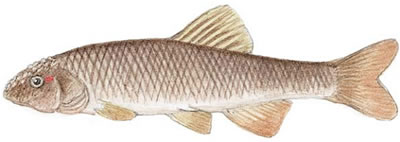The hornyhead chub is a member of the large Cyprinidae family and a fairly common stream and river resident; smaller specimens are used as bait by anglers.
Identification
The body of a hornyhead chub is slender with a rounded snout. The mouth is large, almost terminal, with a small barbel above the jaws, and it has pharyngeal (throat) teeth. The hornyhead chub has dark-edged scales, a complete lateral line, and seven anal rays. Its coloring is bluish olive on the back, yellowish with iridescent green on the sides, and whitish on the underside.On the adult male, there is a bright red dot behind each eye; on the female, the dot is brassy colored. Yellow iridescent stripes run along the back and the sides. There is a dark caudal spot, which is darkest on juveniles, around the snout. Breeding males are colored pink with pinkish-orange fins and have many tubercles on their heads.
 |
 |
The hornyhead chub can be distinguished from a bull chub (Nocomis raneyi) by its shorter snout, larger eyes, and a red dot behind each eye. The bluehead chub (Nocomis leptocephalus), although strikingly similar, has no red dot behind each eye, and it has a large loop on the right side of its intestine, distinguishing it from the hornyhead.
